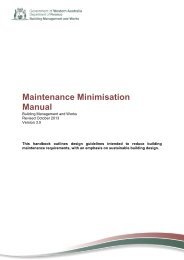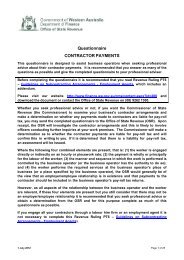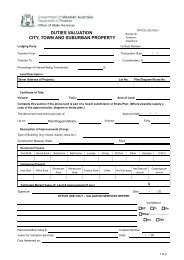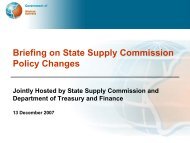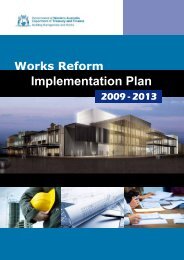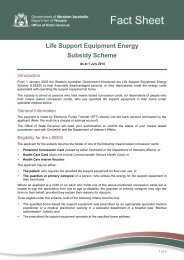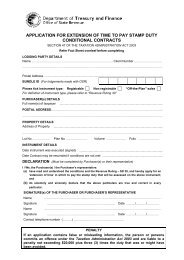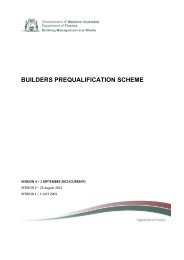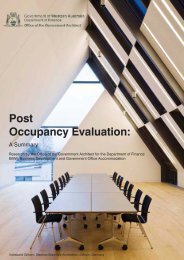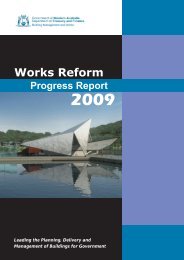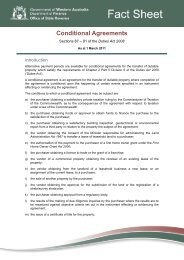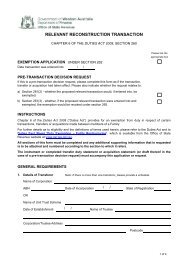Wages Definition - Department of Finance - The Western Australian ...
Wages Definition - Department of Finance - The Western Australian ...
Wages Definition - Department of Finance - The Western Australian ...
- No tags were found...
You also want an ePaper? Increase the reach of your titles
YUMPU automatically turns print PDFs into web optimized ePapers that Google loves.
Revised 1 July 2006Pay-roll TaxGeneral InformationABN 66 012 878 629
1 What is pay-roll tax?Pay-roll tax is a tax assessed on the wages paid by anemployer in <strong>Western</strong> Australia at the rate <strong>of</strong> 5.50%.<strong>The</strong> tax is self-assessed – the employer calculates theliability and pays the appropriate amount to the Office <strong>of</strong>State Revenue on a return. Pay-roll tax is collected by theOffice <strong>of</strong> State Revenue for the <strong>Western</strong> <strong>Australian</strong>Government.2 Who must pay pay-roll tax?An employer, or group <strong>of</strong> employers, who pays wages inexcess <strong>of</strong> $62,500 in any month will be liable for pay-rolltax. Group members must register for pay-roll tax if theypay, or are liable to pay, wages during a month.<strong>The</strong> amount <strong>of</strong> $62,500 includes amounts paid:• to employees in all <strong>Australian</strong> States and Territoriesalthough pay-roll tax is only assessed on <strong>Western</strong><strong>Australian</strong> taxable wages.• to contractors where an employer/employeerelationship exists between the employer and thecontractor. For more detailed information on thepay-roll tax liability <strong>of</strong> payments to contractors, referto the <strong>Wages</strong> <strong>Definition</strong> brochure and/or RevenueRuling PT6 on our website;• by any other business required to be grouped withthe employer. Refer to Item 6 for information aboutthe grouping <strong>of</strong> employers; and• by way <strong>of</strong> remuneration by an employment agent toa person who was engaged to perform services for aclient <strong>of</strong> the employment agent.Annual pay-roll tax thresholds are as follows:YearThreshold1/7/2003 to current $750,0001/7/1997 to 30/6/2003 $675,0001
3 What payments are taxable?<strong>The</strong> definition <strong>of</strong> wages in the Glossary <strong>of</strong> the Pay-rollTax Assessment Act 2002 includes salary, wages,commissions, bonuses, allowances, fringe benefits,superannuation contributions, director's remunerationand specified taxable benefits.• Salaries and wagesPay-roll tax is payable on the gross salary orwage <strong>of</strong> an employee including entitlements anddeductions made on behalf <strong>of</strong> the employee,e.g. income tax, hospital benefit fund contributions,union fees, superannuation, etc.Holiday pay and termination payments such asaccrued leave entitlements or deferred wages areliable to pay-roll tax. Payments to contractors aretaxable where an employer/employee relationshipexists between the employer and the contractor.• Commissions, bonuses and allowancesPay-roll tax is payable on the amount <strong>of</strong>commissions, bonuses and allowances paid toemployees. Living away from home allowances aretaxable in full, but exemptions are provided forreasonable motor vehicle and accommodationallowances (see Item 4).• Director’s remunerationPayments made to a director, whether as a workingdirector or not.• Superannuation contributionsEmployer contributions to a superannuation fund.For a detailed explanation <strong>of</strong> the pay-roll tax liability<strong>of</strong> contributions to an employee's superannuationfund, please refer to the Superannuation brochure.2
• Fringe benefitsFringe benefits, as defined and valued for thepurposes <strong>of</strong> the Commonwealth's Fringe Benefits TaxAssessment Act 1986, are generally liable to pay-rolltax.From 1 January 2002, the grossed-up Fringe Benefitsamount is taxable.For a detailed explanation <strong>of</strong> the pay-roll tax liability<strong>of</strong> fringe benefits, please refer to the Fringe Benefitsbrochure.• Eligible Termination PaymentsEligible termination payments are subject to pay-rolltax as per the definition given to them in section 27A<strong>of</strong> the Commonwealth’s Income Tax Assessment Act1936 from 1 July 2003.For more detail on eligible termination payments,please refer to the <strong>Wages</strong> <strong>Definition</strong> brochure.• Specified Taxable BenefitsA number <strong>of</strong> benefits that are not fringe benefitsunder the Fringe Benefits Tax Assessment Act 1986are liable to pay-roll tax.<strong>The</strong>se benefits are contributions by an employer to:– an industry redundancy fund;– a portable long service leave fund; or– an employee share acquisition scheme.For more detail on prescribed benefits, please refer tothe <strong>Wages</strong> <strong>Definition</strong> brochure.3
4 What payments are not taxable?<strong>The</strong> following payments are not taxable:– payments to apprentices under the Industrial TrainingAct 1975;– payments to employees under the provisions <strong>of</strong> theWorkers Compensation and Rehabilitation Act 1981;– payments to employees who are absent in thedefence forces;– payments to trainees employed under a trainingagreement as part <strong>of</strong> the <strong>Australian</strong> traineeshipsystem established by the governments <strong>of</strong> theCommonwealth and the State;– wages paid to an employee in <strong>Western</strong> Australia areexempt after six months, where the wages are paidin respect <strong>of</strong> services performed by the employeewholly in another country, for a continuous periodexceeding six months. For more detailed information,please refer to Revenue Ruling PT4; and– motor vehicle and accommodation allowances areexempt, provided they do not exceed prescribedlevels. <strong>The</strong> prescribed reasonable levels include anycents per kilometre or dollars per night specified inan award. In the absence <strong>of</strong> such specification theexempt rates are as follows:Motor Vehicle67 cents perkilometreAccommodation• Within WA – $110• Interstate – $145• Overseas – $200Amounts paid in excess <strong>of</strong> the prescribed rate areliable to pay-roll tax.<strong>The</strong> exempt per-kilometre rate <strong>of</strong> motor vehicleallowance is applicable only to business travel, relatesto a vehicle provided and maintained by the person,and is only applicable where records are maintainedthroughout the financial year to verify businesskilometres travelled.4
However, tax is paid by each individual group memberonly on the wages paid in its own right. For a detailedexplanation <strong>of</strong> the grouping provisions, please refer tothe Grouping Provisions brochure.A business may be excluded from a group where theCommissioner is satisfied that there are adequatereasons for doing so. However, no exclusion can bemade where:– the same person or persons together own(s) more than50% <strong>of</strong> two or more businesses; or– a corporation is related to another corporation underthe Corporations Act 2001.7 Taxpayer obligationsRegistration – An employer liable for pay-roll tax mustregister with the Office <strong>of</strong> State Revenue within sevendays <strong>of</strong> the close <strong>of</strong> the month in which wages exceed$62,500 in a month. Group members must register forpay-roll tax once they commence paying, or are liable topay taxable wages.Applications for registration can be obtained from theOffice <strong>of</strong> State Revenue or from the <strong>Department</strong>’swebsite.Returns – Following registration, return forms areautomatically sent to employers each month.A monthly return declaring wages paid must be lodged,together with the tax payable, within seven days <strong>of</strong> theend <strong>of</strong> the month to which the return relates.Keeping Records – Employers are required to maintainproper books and records for a minimum <strong>of</strong> five years.6
Access to Records – <strong>The</strong> Commissioner, or anyauthorised <strong>of</strong>ficer, has full and free access to all places,books, documents and other papers, for the purpose <strong>of</strong>verifying returns or liability, and may make extracts orcopies <strong>of</strong> such books, documents or papers. It is an<strong>of</strong>fence to obstruct authorised <strong>of</strong>ficers in theperformance <strong>of</strong> their duties.8 Pay-roll tax rate<strong>The</strong> pay-roll tax rate in <strong>Western</strong> Australia is 5.50%.<strong>The</strong> calculation <strong>of</strong> pay-roll tax payable is explained inbrochures entitled ‘Calculation <strong>of</strong> Tax Payable’.Included with each pay-roll tax return is an 'AssessmentAdvice’ which provides a record <strong>of</strong> the taxablewages returned and the tax paid for the previousperiod. Any under or over payment <strong>of</strong> pay-roll tax willappear on the Assessment Advice and the return form toenable the adjustment to be taken into account for thenext period.9 When is penalty tax imposed?Penalty tax is imposed if any taxpayer:– fails to register as and when required;– fails to lodge returns and payments on time;– underpays tax due;– understates wages in returns; or– provides false or misleading information.Taxpayers who voluntarily declare liability under thosecircumstances may incur significantly lower penaltytax than those who do not.7
10 Objections against an assessmentA person who is dissatisfied with an assessment may,within a period <strong>of</strong> 60 days after the date <strong>of</strong> issue <strong>of</strong> theassessment, forward to the Commissioner an objectionin writing stating the grounds on which the objection ismade. <strong>The</strong> statement must be explicit, stating fully thegrounds <strong>of</strong> objection and be accompanied by relevantsupporting evidence. A person who is dissatisfied withthe decision on an objection may, within 60 days afterservice <strong>of</strong> notice <strong>of</strong> the decision, seek review <strong>of</strong> thedecision to the State Administrative Tribunal(www.sat.justice.wa.gov.au) against that decision.Lodgment <strong>of</strong> an objection or review does not affect theliability to pay the tax assessed.11 Is pay-roll tax payable on anyGST component <strong>of</strong> wages?Pay-roll Tax is not payable on any component <strong>of</strong> wagesthat is directly attributed to the GST.As a general rule, wages are not subject to the GST.However, under the Pay-roll Tax Assessment Act 2002,certain payments such as payments to contractors can bedeemed to be wages for the purposes <strong>of</strong> the Act, andthese payments may include a GST component.Where this occurs, pay-roll tax is not payable on the GSTcomponent <strong>of</strong> the payment.For example, where a contractor (payments to whom aredeemed wages and therefore liable to pay-roll tax) ispaid an amount <strong>of</strong> $2,200 which includes GST <strong>of</strong> $200(10% <strong>of</strong> $2,000), pay-roll tax is payable on $2,000.Accordingly, all ‘wages’ subject to pay-roll tax are treatedconsistently in respect <strong>of</strong> the GST and the amount <strong>of</strong>pay-roll tax paid by an employer is not increased by theGST amount.8
12 Paying your pay-roll tax liabilityPay-roll tax can be paid by the Revenue Online clientinitiated payment system, BPAY or Electronic Funds Transfer(EFT). Revenue Online can be accessed via the Office <strong>of</strong>State Revenue website. Refer to the Revenue OnlineBrochure for further information.From 1 July 2006, it is mandatory for an employer that has, oris a member <strong>of</strong> a group that has, an expected pay-roll taxliability equal to or greater than $100,000 per annum, tolodge and pay their pay-roll tax return via Revenue Online.Clients still lodging paper based returns may only pay bycheque.9
This pay-roll tax information should be used only as aguide and if you have any questions regarding yourliability or require more detailed information, pleasecontact the Office <strong>of</strong> State Revenue.Office <strong>of</strong> State RevenueGPO Box T1600Perth WA 6845OROffice <strong>of</strong> State RevenuePlaza Level200 St Georges Terrace, PERTH WATelephone: (08) 9262 13001300 368 364 (WA Country callers)Facsimile: (08) 9226 0841Email: payroll@dtf.wa.gov.auWebsite: www.osr.wa.gov.auThis information may be obtained in alternative formatupon request.0986–07/05–500ISBN 0 7307 4504



